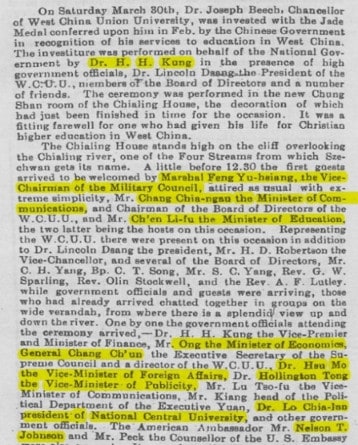│By Liping Yang, Publishing Manager, Digital Archive and eReference, Gale Asia│
Reverend Dr Joseph Beech played an instrumental role in founding and running West China Union University, first as its founding president and later its chancellor, due to his vision, foresight, and resourcefulness. Today, March 11, 2020, marks the 110th anniversary of the founding of the university, one of the thirteen Christian universities established in China before 1949. Based on a perusal and research of articles published in English periodicals such as West China Missionary News, The Chinese Recorder and Educational Review, all available in Gale’s China and the Modern World archive, as well as his correspondence with the American Methodist Episcopal Church, available in Nineteenth Century Collections Online: Asia and the West, this essay attempts to reconstruct the story of this great missionary-educator who dedicated forty years of his life to the advancement of education in China, especially West China.
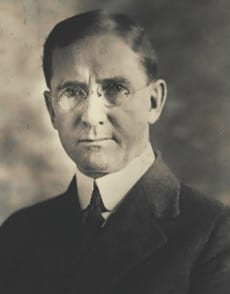
(Source: Yale Divinity School Library: link)
Joseph Beech (1867–1954) was born in England in 1867 and moved to the United States as a young boy. Shortly after he graduated from Wesleyan University in 1899 with a Bachelor’s degree in Philosophy, he was dispatched by the Board of Foreign Missionaries of the Methodist Episcopal Church to West China, probably under the influence of the Student Volunteer Movement. This movement started in the United States in the late 1880s with the ambitious aim to bring about “the evangelization of the world in this generation.” He first spent time in Chungking before moving to Chengtu, Sichuan in 1905 where he worked as the president of Chengtu College. In 1914, he became one of the founders and first president of the West China Union University (WCUU; 华西协和大学). WCUU was an interdenominational Christian university established and run in Chengdu under the cooperation of the following institutions:
- American Baptist Church Mission
- Friends’ Foreign Mission Association of Great Britain and Ireland
- Methodist Church of Canada (later United Church of Canada)
- Methodist Episcopal Mission
- Church Missionary Society of England.
Beech served as WCUU’s chancellor during 1931–1941 before retiring to the States. He passed away in 1954 in Chicago.
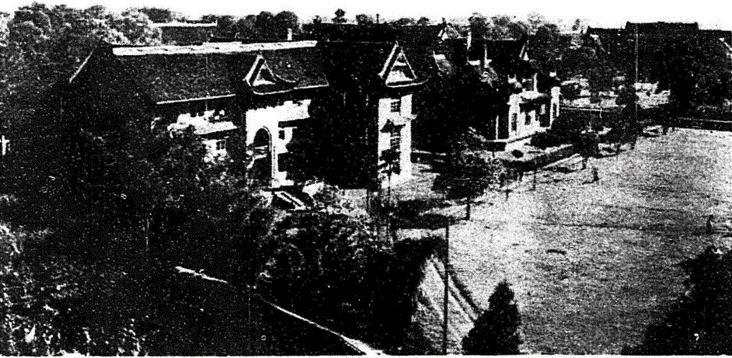
Arrival in West China
In 1899, Beech was dispatched by the American Methodist Episcopal Mission to Sichuan. Information relating to his early years in China is scarce; however, his name appeared in two lists published in West China Missionary News in 1906 and 1907:
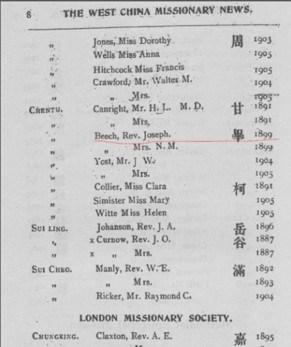
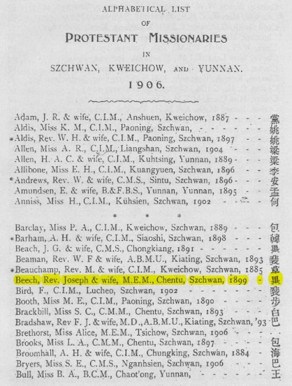
Campaigning for the Founding of the University
Preparation for the Union University started in 1905 and a Temporary Board of Management WCUU was founded to handle this. Beech was appointed a member of this Board together with H.T. Hodgkin, H.D. Robertson, H.T. Silcock, E. Williams, J. Taylor, J. W. Yost, Dr Canright, E.J. Carson, and C.R. Carscallen. The Board did a lot of work to justify the reason and benefits of establishing “a Christian university in West China.” For instance, in “Raison D’Etre of a Christian University in West China,” a report presented by the Board to the University of Chicago Commissioners—Professors Ernest. D. Burton and Thomas C. Chamberlain who were conducting a survey of the educational scene in China to study the feasibility of establishing a university in China—in 1909, the board members advanced the following arguments: establishing and running a Christian university/college is an important part of the missionary work; any existing government universities in western China could not be relied on to accomplish their goals because these universities were run on a different set of ideas and more importantly “the education given [by such universities] falls short of what we hope to give in our University”; and “it is better for us to mature an independent scheme, and put all that we can into that.”
As for the benefits of building a such a union university, the board maintained that it would serve as a best venue to deliver the “full Christian message . . . to a non-Christian nation” by reaching the “higher intellectual life”; it would “bring the best ideals of Western education to bear upon the [Chinese] situation” with a “University managed and staffed by men whose whole intellectual outlook has been moulded by these ideals and not those who know little more than the superficial results and catch words of Western Learning”; more importantly it would help in the training of “the leaders of the new China,” talents needed urgently by China in her social and political life in different capacities including “ministers, teachers, writers, and so forth.”
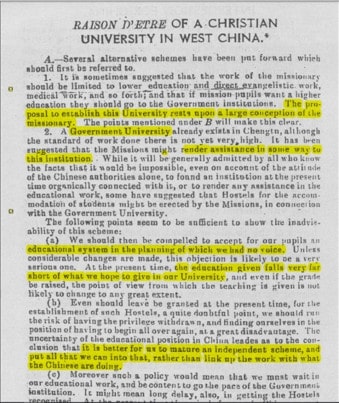
Raising Funds
West China Union University opened its doors on March 11, 1910 in “temporary buildings to welcome eleven students. There were eight teachers, six Westerners and two Chinese.” There was only one faculty, Faculty of Arts. By the time Dr Joseph Beech retired, the university had expanded to include another five Faculties—Science, Medicine, Religion, Education, and Dentistry—housed in different well-built and -designed buildings. And the student population had also increased to 544, including 198 women.
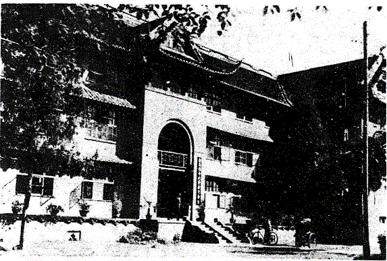
Regarding Beech’s considerable contributions, in “History of the Union University: A Sketch,” H. D. Robertson described him as someone “smiling his way through all sorts of difficulties and bringing to definite conclusions all manner of suggestions and ideas. In Western countries we see him going from place to place telling the tale of this university and its opportunities, and interesting men so that they give with confidence the money needed for the University.” Such fundraising efforts can be found in Beech’s correspondence and articles on the history of West China Union University.
For instance, in a letter dated January 20, 1920, Beech made a list of 10 pledges he had “secured in the first half of 1919 for the University” which add up to $82,000. In the list are included the names of donors, total amounts pledged, and amounts already paid. The designated purposes were also clearly given such as “Memorial bldg.” and “Endowment of chair.” What is more, these pledges constitute “just a portion of the more than $400,000 included in the Centenary budget for West China Union University.” In other words, there would be a still a long way to go for him at the time of writing the letter.
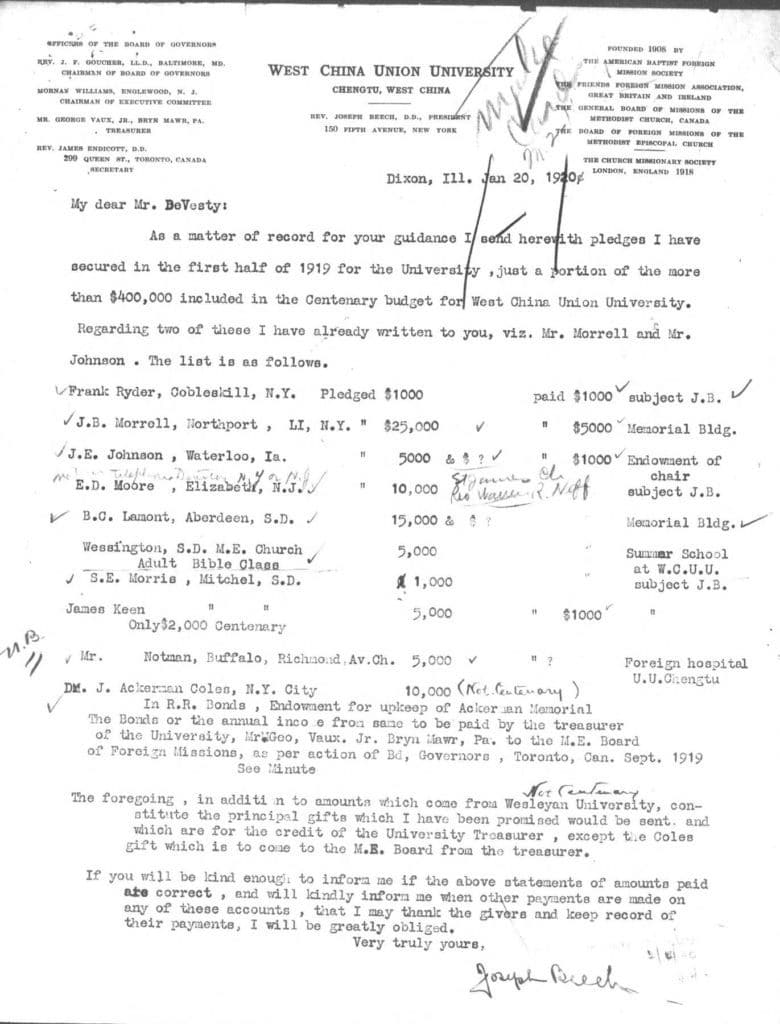
According to an article published in connection with Beech’s retirement in 1940, funds raised by him in the United States “represent a large part of the entire property of the Chengtu[-based] West China Union] University. He has been instrumental in obtaining over $5,000,000. The educator estimates the value of all the old buildings of the school at approximately U.S.$1,000,000 while N.C.$1,000,000 worth of new buildings, including the United Hospital, are being built.”
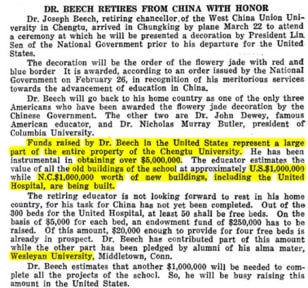
Hiring Staff for the University
Beech’s contributions lie not just in raising funds for the university. He also played an important role in hunting qualified faculty members from the US. In a letter dated October 28, 1919, Beech maintained that personal relationship between university staff and job applicants should not influence the hiring decision and therefore he suggested the board of governors reject the application of a Ralph and his wife. This shows his principles of impartiality and fairness in staffing the university. At the same time, in the same letter, he expressed his strong interest in hiring a Dr Liljestrand whose training in physiological laboratory work would enable him to “render our mission far more valuable service at the University than elsewhere” and “interest young boys and men in medicine”; and more importantly such “scientific physiologists” are “difficult to secure.”
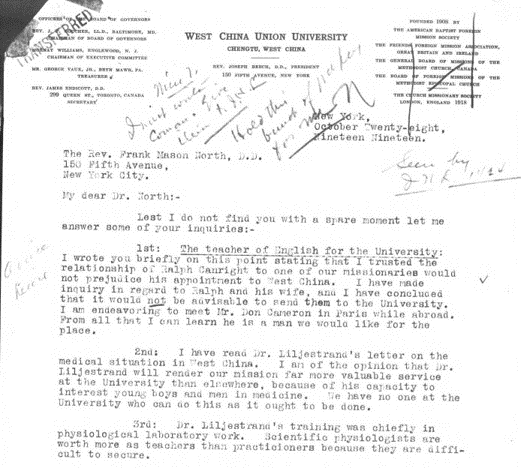
Maintaining a good relationship with Chinese government officials
To run a Christian university in western China whose curriculum was vastly different from the government-run local universities, the management of West China Union University had to build and maintain a good relationship with the Chinese governments at the municipal, provincial, and national levels. This would help the university in various aspects such as obtaining governmental recognition, securing additional financial sources, and ensuring employment opportunities for the university’s graduates. Beech did an excellent job in this aspect, as shown in his communication with some high-ranking Chinese civil and military leaders.
In October 1914, West China Union University held a ceremony on the dedication of the Joyce Building. The event was graced by some prominent government officials of Sichuan Province such as the civil and military governors. The two governors both expressed their appreciation of “what was being done for the people of Szechwan.” They also each donated $3,000 for the university building fund. Moreover, they also managed to secure an endorsement of the university from President Yuan Shih Kai of the Republic of China, which was also accompanied by a cheque of $4,000. On top of these, Hu Ching-I (胡景伊), the military governor, wrote an excellent endorsement of the university with the seal of the provincial government. All this was recorded by Beech in an article published in Educational Review in 1915.
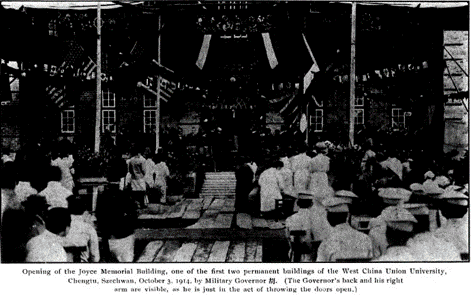
Many foreigners, especially missionaries, and their property in China suffered during the turbulent 1920s which saw highly charged nationalistic and patriotic movements against Western imperialism, unequal treaties, and extraterritoriality. This includes the Northern Expedition (1926–1928) led by Chiang Kai-shek to defeat the warlords and unify China. The most notorious is the Nanking Incident that occurred in March 1927 when homes and businesses of foreign residents in the city were pillaged, leading to about 40 casualties. West China Union University was also affected by this wave of anti-foreign movements.
On January 22, 1927, Dr Beech sent a letter to General Liu Wen Hwei (刘文辉) of the 24th National Revolutionary Army based in Chengdu, Sichuan, expressing his concern over the safety of the university staff. General Liu replied on January 28, promising “on my words of honour that equal rights and liberties would be granted in Szechwan to Chinese Christians and all other Christian citizens; and that adequate protection would be given to all Americans in missionary work, and to school and church property, so long as they work in harmony with the fundamental principles of the Chinese Republic. Moreover, I am being one of the highest military officials in Szechwan, it is my authoritative duty to take every possible responsibility to safeguard all foreign residents against any unwise and unforeseen agitation, so you may rely on me … concerning this matter, especially the West China Union University and all members of its staff.”
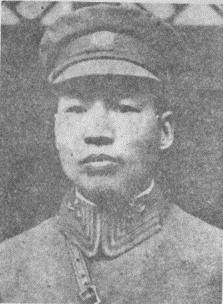
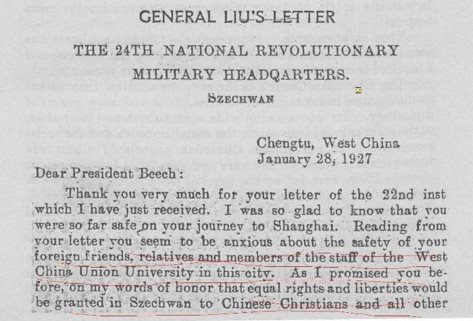
“General Liu’s Letter.” West China Missionary News, 1927, p. 12+. China and the Modern World, https://link.gale.com/apps/doc/HCSEXC807042011/CFER?u=asiademo&sid=CFER&xid=bfd25d7c
This good relationship with the government is reflected nowhere more so than the 1935 graduation ceremony at West China Union University. Generalissimo Chiang Kai-shek and Mdm Chiang, the first family of the then Republic of China, graced the event and left behind some photographs taken during the event, such as that below.
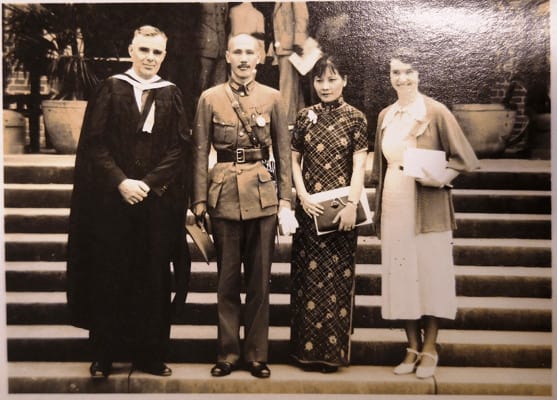
Championing Co-Education
In 1924, eight women students were admitted to West China Union University and the Woman’s College was founded, making the university the first co-educational institution in the interior of the country. On that day, Dr Beech stood at the door of the Administration Building welcoming each of these students. This marked a new chapter in the history of the university. In 1929, the first batch of four women graduated in Education and one in Chinese. The first woman graduated in Medicine in 1932. By 1934, ten years after the college opened, it contributed about one-third of the 561 students enrolled at the university.
While this was the result of the joint efforts made by many people, especially those from the three women’s boards in North America—the Woman’s Missionary Society of the Canadian Methodist Church, the Woman’s Foreign Missionary Society of the Methodist Episcopal Church, and the Woman’s American Baptist Foreign Mission Society—Dr Joseph Beech’s contribution cannot be underestimated due to his “unfailing interest in and concern for higher education of women in West China.”1 According to Mary E. Streeter, Dean of the Woman’s College, Dr Beech was “one of the staunchest friends of the College. He not only approved … of the establishment of the College but he gave unstintingly of time and advice to the project. The fact that the Woman’s College has been from its inception an integral part of the University is due, in great part to the wisdom and vision of Dr Beech.” Moreover, he “went a further step and advocated co-education.”
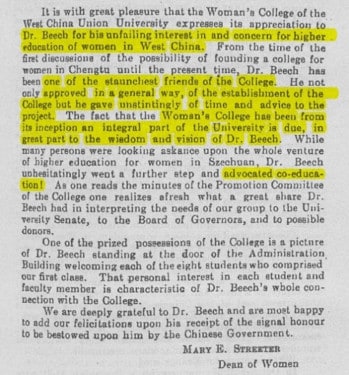
Retiring with Great Honour
Dr Beech’s invaluable contribution to the establishment of West China Union University and the higher education and culture of China won the recognition of the Chinese central government. He received a Special Order, the Diploma of the First Class, and the decoration of the Jade Medal from the Chinese government when he retired in 1940. This Jade Medal had only been granted to two other Americans, Prof. John Dewey and Dr Nicholas Murray Butler, president of Columbia University.
Generalissimo Chiang Kai-shek delivered a farewell address to Dr Joseph Beech on March 18, 1940, calling him a Western sage who played a pivotal role in building West China Union University that “itself has become one of the greatest centers of learning, with outstanding scholars and professors whom Dr Beech has engaged both in China and abroad. Dr Beech is indeed worthy of highest admiration. His whole life has been given for the education of this country … The great personality and spirit of Dr Beech will be immortal with the enterprise which he has created here in this country. He will be remembered forever by the Chinese scholars and students.”2
A ceremony of investiture was held in the university on March 30, 1940 and well attended by many VIPs including Dr H. H. Kung (孔祥熙), Vice Premier and Minister of Finance; Marshal Feng Yu-hsiang (冯玉祥), Vice-Chairman of the Military Council; Mr Chang Chia-ngau (张嘉傲), Minister of Communications; Mr Chen Li-fu (陳立夫), Minister of Education; General Chang Ch’un (张群), Executive Secretary of the Supreme Council; Dr Hsu Mo (徐谟), Vice Minister of Foreign Affairs; and Dr Hollington Tong (董显光), Vice Minister of Publicity. All speakers heaped praises on Dr Beech for his considerable contributions to the university and the education and cultural life of the country. In his reply, Dr Beech said “he was fortunate to have two countries, that of which he was proud to be a citizen, and that for which he had worked for forty years, and which he loved deeply; and because he loved China and felt she deserved the best kind of Christian college that was possible, he had worked these thirty years to that end.”
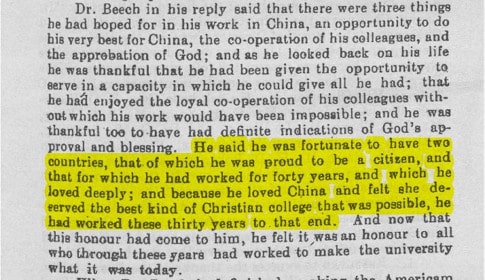
Interested in reading more about the history of early twentieth-century China, using primary sources? Check out Dr. Sun Yat-sen, the man who led China from Empire to Republic, or Dr Wu Lien Teh as a Travelogue Writer – A short review of three travel essays written by Wu in China in the 1930s, also by Liping Yang.
- Lewis Calvin Walmsley. West China Union University. New York: United Board for Christian Higher Education in Asia, 1974. pp79-85.
- Joan Beech. “Farewell Address to Joseph Beech from Chiang Kai-Shek”. http://beechchinawest.com/. December 18, 2009.

